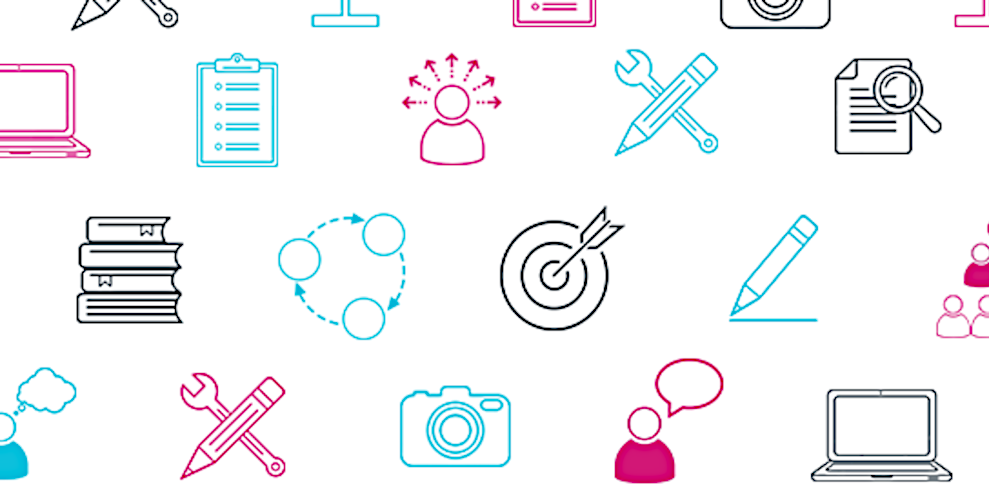
In this post, Gavin McCabe, Careers and Employability Manager from the Careers Service, spotlights the Reflection Toolkit – an invaluable resource for reflective practice in the HE sector and beyond. The toolkit, co-created by Gavin and Tobias Thejll-Madsen, responds to the evergreen question posed to reflection practitioners: “how do I even get started?” As Gavin attests, the toolkit has been a deeply successful answer, clarifying the practical ‘ins and outs’ of reflection, and supporting both staff and students at all stages of their reflective journeys. This post is part of the Learning & Teaching Enhancement Series: Reflective Learning.
So, you’d like to introduce or deepen reflection as part of your learning and teaching, but you’re not sure where to start? You’re not alone. More and more colleagues across the sector and beyond are looking to harness the power of reflective learning. Their drivers, and perhaps yours, are many and varied and include areas such as experiential learning, authentic assessment, and equipping learners for personal and professional success in diverse contexts. But colleagues also struggle to know where to go for information, advice, or support – reflection doesn’t typically ‘belong’ to one part of an institution and therefore sources of expertise covering diverse needs can be hard to find.
That’s where the Reflection Toolkit comes in. Developed to support both students and staff, it now receives well over a million visits a year and its impact is extending within and beyond higher education. Read on to learn about what it is, how it can help you, and some places to start when thinking about reflection.
The need
In designing and leading institution-wide initiatives that have reflection at their heart, I have repeatedly seen the power, impact, and flexibility of reflection across multiple domains. For example:
- Student-Led, Individually-Created Courses within the formal credit-bearing curriculum;
- the Edinburgh Award as a personal and professional development framework in the co-/extra-curricular space; and
- the Making Transitions Personal (MTP) Pre-Arrival and Start-of-Year Reviews used by students and staff as part of the wider student support ecosystem.
The value and potential of reflection frequently resonates with colleagues who then seek advice, structures, and examples to help them embed reflection themselves. But I and others recognised a gap. There was no single, clear place within the University or beyond for people to go if they were interested in reflection for themselves or in supporting it for others, covering multiple needs and scenarios.
In 2018, Tobias Thejll-Madsen and I worked to plug this gap, and so the Reflection Toolkit was born.
The outcome: The Reflection Toolkit
We knew that when facilitated well, reflection can have a powerfully positive and lasting impact, but when executed poorly it can alienate everyone involved. We drew on experience, practice, and research from across the University and sector to create a pragmatic resource that supports effective reflective practice.
The Reflection Toolkit targets two audiences – reflectors and facilitators of others’ reflection – recognising that students and staff can occupy both roles. It encompasses a range of purposes, abilities, and confidence levels around reflection, ensuring users feel supported, regardless of whether they are new to reflection or experienced.
The impact: widespread and welcomed
As an open educational resource with well over a million visits a year, the Reflection Toolkit is having real impact within the University and beyond and is highlighting the live interest in reflection. Within the University, we frequently hear how it helps students and staff engage and go further with reflection, and is signposted widely and embedded, for example within the University’s digital portfolio system, PebblePad. Beyond the University, alongside a wide variety of international higher education colleagues, we continue to be surprised by the diversity of settings engaging with the Reflection Toolkit and using it to support their practice and provision – from national training for surgeons, police, and armed services, to specialists NHS nurses and regional children’s services.
Regardless of the setting, people highlight how much they appreciate the practical support and advice, effective examples, and robust information, together with some of the academic context and theoretical literature underpinning it. Staff particularly value not having to reinvent the wheel, or indeed having to delve into something where they perceive they lack deep expertise, but that they are enabled to harness it for their disciplinary domain.
The three sections: where to start whatever your interest
The Reflection Toolkit has three key sections, each providing robust starting points to accommodate different interests and needs…
- The Reflectors’ Toolkit: Resources, models, and prompts for people who want to reflect, for whatever purpose. This includes reflective models with written examples; using reflection for different purposes (e.g. working towards goals and objectives, employability, and self-awareness); videos of students sharing their advice and experiences of reflection; and ways to reflect, including producing academic reflections.
- The Facilitators’ Toolkit: Considerations and information about implementing reflection in courses, workshops, and other initiatives. This includes deciding whether to include reflection; how to introduce and communicate it; ways of reflecting; case studies; and assessing reflection and providing feedback, including assessment rubrics.
- Literature: Information on the historical development of the concept of reflection, the evidence behind whether reflection works, the literature used in developing the Reflection Toolkit, and helpful starting points to explore the area further.
There is a wide range of examples embedded in the Reflection Toolkit, for both reflectors and facilitators. To delve further, see Teaching Matters’ 2022 series on embedding reflective learning in the curriculum or the diversity of articles exploring reflection-enhanced practice.
Looking back and looking ahead
As you consider embedding or deepening reflection in your own learning and teaching, step forward bravely and compassionately. Take your learners along with you on the journey, reflecting together as you go, and sharing your learning and insights generously. Reflection allows us to learn from our experiences, but we don’t always have to start from scratch. We can also reflect on and learn from others’ experiences and insights to help propel us forward further and faster. The Reflection Toolkit aims to enable exactly that.
And, of course, as advocates of reflection, we’re always keen to hear suggestions and offerings of improvements to the Reflection Toolkit that would help you and your community – please get in touch! You can reach us at Gavin.McCabe@ed.ac.uk.
 Gavin McCabe
Gavin McCabe
Dr Gavin McCabe is a Careers and Employability Manager in The University of Edinburgh’s Careers Service and previously led the Employability Consultancy, in both roles leading and shaping strategy and activities around students’ employability, development, and graduate attributes. Gavin co-leads the Student-Led, Individually-Created Courses (SLICCs) and GEL-Lab initiatives, co-authored the Reflection Toolkit, provided subject-matter expertise on graduate attributes for Skills Development Scotland, and led the design and delivery of strategic institution-wide initiatives such as the Edinburgh Award, Making Transitions Personal, and MyDevelopmentHub.
 Tobias Thejll-Madsen
Tobias Thejll-Madsen
Tobias Thejll-Madsen is and has been involved with part-time work across The University of Edinburgh on educational research and development. He has previously worked with the University’s Employability Consultancy, where he was a co-author of the Reflection Toolkit and developed resources for embedding employability and student development into the curriculum. He is currently a full-time PhD student with the University of Glasgow where he researches non-verbal communication and emotions.

